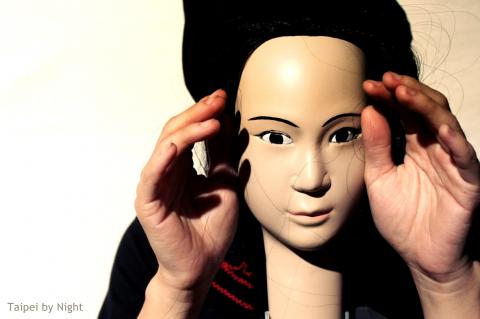The Taiyuan Puppet Theatre Company (台原偶戲團) has never been averse to taking risks, and its newest production, Taipei by Night, which premiered last night at the Taipei Cinema Park (台北市電影主題公園) in Ximen (西門), takes the group’s innovative approach to puppet theater further than ever before. A film noir inspired tale of encounters set in contemporary Taipei, with characters that include corrupt legislators, mobsters and bar girls, and playing against a jazz soundtrack, the show is a celebration of the seedier side of life in the capital.
Taipei by Night is the result of a collaboration between Taiyuan and theater director Clinton Turner Davis, who also worked on the troupe’s production Pilgrimage (朝聖之行) last year.
Davis said that his fascination with puppetry includes the use of gesture, non-verbal communication and the ability of the puppet to greatly enhance the expressive function of a performer. He particularly appreciates the multiplicity of disciplines that Taiyuan was brought to this new method of storytelling.

Photo courtesy of the Taiyuan Puppet Theatre Company
“That is one of the beauties of working with the company [Taiyuan]. They [the performers] come from such a wide variety of backgrounds: dance and mime and various types of movement, and many different types of puppetry skills that are all combining into this new form, and the use of puppetry to extend and amplify the expression of these really inanimate objects.”
Inanimate objects link this very modern production with Taiyuan’s roots in traditional puppetry. According to director Wu Shan-shan (伍姍姍), the puppet heads used in the show are taken from traditional Cantonese puppet performances and are manipulated by a unique mechanism created by Taiyuan, though they have been extensively adapted so that they can be strapped to performers, who provide the arms and legs.
The point of departure for Taipei by Night is
a detective novel by Taiyuan’s artistic director Robin Ruizendaal.
“The challenges of bringing something so complex as a novel into a puppet show are very great,” Wu said. To help convey some of the detail of the story, Wu decided to use a narrator. “Film noir often uses the device of a narrator, either a first person or third person narrator, who can explain or clarify the feelings of a character. We thought this could work very well in this production,” she said.
The story excavates the underbelly of business, politics, and the media.
“We want to show that puppet theater does not have to be childish,” said Wu. “It can be very mature as well.”
Under Ruizendaal, Taiyuan has focused on developing a new kind of puppet theater. Although the group continues to use some traditional Taiwanese puppets for these experimental productions, dance, mime, music and audiovisual elements have begun to play an increasingly large role.
Taiyuan has pushed forward its experimental productions on many fronts, from relatively straightforward East meets West combinations such as incorporating Italian opera or European styles of puppetry, to producing a puppet show in which much of the action takes place in a paddling pool filled with water — the aforementioned Pilgrimage.
Puppeteers have been pushed out from behind the traditional screen and put directly in front of the audience, performing along with the puppets they manipulate. Mostly, though, the troupe has stuck with stories linked to Chinese tradition.
In Taipei by Night, with its jazz soundtrack and modern urban setting, Taiyuan’s puppets are embarking on a journey into a brave new world of artistic expression.
Tickets for Taipei by Night are NT$450 and NT$650, available through NTCH ticketing and online at www.artsticket.com.tw. Performances are today, tomorrow and Sunday at 7:30pm at the Taipei Cinema Park (台北市電影主題公園), 19 Kangding Rd, Taipei City (台北市康定路19號).

April 28 to May 4 During the Japanese colonial era, a city’s “first” high school typically served Japanese students, while Taiwanese attended the “second” high school. Only in Taichung was this reversed. That’s because when Taichung First High School opened its doors on May 1, 1915 to serve Taiwanese students who were previously barred from secondary education, it was the only high school in town. Former principal Hideo Azukisawa threatened to quit when the government in 1922 attempted to transfer the “first” designation to a new local high school for Japanese students, leading to this unusual situation. Prior to the Taichung First

Chinese Nationalist Party (KMT) Chairman Eric Chu (朱立倫) hatched a bold plan to charge forward and seize the initiative when he held a protest in front of the Taipei City Prosecutors’ Office. Though risky, because illegal, its success would help tackle at least six problems facing both himself and the KMT. What he did not see coming was Taipei Mayor Chiang Wan-an (將萬安) tripping him up out of the gate. In spite of Chu being the most consequential and successful KMT chairman since the early 2010s — arguably saving the party from financial ruin and restoring its electoral viability —

The Ministry of Education last month proposed a nationwide ban on mobile devices in schools, aiming to curb concerns over student phone addiction. Under the revised regulation, which will take effect in August, teachers and schools will be required to collect mobile devices — including phones, laptops and wearables devices — for safekeeping during school hours, unless they are being used for educational purposes. For Chang Fong-ching (張鳳琴), the ban will have a positive impact. “It’s a good move,” says the professor in the department of

Article 2 of the Additional Articles of the Constitution of the Republic of China (中華民國憲法增修條文) stipulates that upon a vote of no confidence in the premier, the president can dissolve the legislature within 10 days. If the legislature is dissolved, a new legislative election must be held within 60 days, and the legislators’ terms will then be reckoned from that election. Two weeks ago Taipei Mayor Chiang Wan-an (蔣萬安) of the Chinese Nationalist Party (KMT) proposed that the legislature hold a vote of no confidence in the premier and dare the president to dissolve the legislature. The legislature is currently controlled